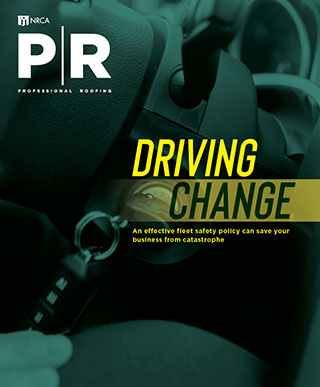Asphalt shingles are the most popular roofing product in the United States. According to roofing industry sources, more than 150 million squares (1.4 billion m²) of asphalt shingles are manufactured and installed annually. But despite asphalt shingles' popularity, it often is difficult to differentiate between the products because manufacturers don't disclose pertinent technical information related to applicable standards.
Standards
Most asphalt shingles currently manufactured for use in the United States comply with one of two ASTM International standards. ASTM D225, "Standard Specification for Asphalt Shingles (Organic Felt) Surfaced with Mineral Granules," applies to organic mat-reinforced asphalt shingles, and ASTM D3462, "Standard Specification for Asphalt Shingles Made From Glass Felt and Surfaced with Mineral Granules," applies to fiberglass mat-reinforced asphalt shingles.
ASTM D225 and ASTM D3462 include provisions defining asphalt shingle products' minimum and maximum masses, physical properties and performance properties.
Both ASTM D225 and ASTM D3462 are included in the International Building Code and NFPA 5000: Building Construction and Safety Code as minimum requirements for asphalt shingles.
Compliance
Review of asphalt shingle manufacturers' product data contained in NRCA's 2005-2006 Steep-slope Roofing Materials Guide reveals all 13 of the organic mat-reinforced asphalt shingles included comply with ASTM D225. For fiberglass mat-reinforced asphalt shingles, 91 of the 104 included in the guide comply with ASTM D3462.
Current asphalt shingle product compliance with the applicable ASTM product standards noticeably have improved since several years ago when less than 50 percent of fiberglass mat-reinforced asphalt shingle produced complied with ASTM D3462.
Differentiation
Although asphalt shingle manufacturers generally comply with applicable ASTM product standards, few manufacturers represent their products regularly exceed ASTM's minimum and maximum masses and physical properties. Review of manufacturers' product data in the guide reveals manufacturers' reported masses and physical properties for asphalt shingle products with 20-year warranties are identical to those products with 50-year or lifetime warranties. Although it is clear most premium asphalt shingle products have masses and physical properties that exceed those of commodity asphalt shingle products, asphalt shingle manufacturers' apparent reluctance to differentiate their products with technical data is of concern because the information isn't easily obtained by roofing professionals.
One useful way to differentiate among asphalt shingle products is to evaluate products based on the test methods contained in product standards and at recognized increased levels of performance. For example, though wind testing according to ASTM D3161, "Standard Test Method for Wind-Resistance of Asphalt Shingles," is conducted at a 60-mph (27-m/sec) level as part of complying with ASTM D225 and D3462, ASTM D3161 also allows for testing at higher wind speeds.
Asphalt shingles passing the ASTM D3161 wind test at 90 mph (40 m/sec) are represented as being Class D and at 110 mph (49 m/sec) as being Class F. Eighteen of the 117 asphalt shingle products in NRCA's guide are represented by their manufacturers as being Class F based on ASTM D3161. This information is not publicized, and roofing contractors either have to refer to NRCA's guide for the information or contact the manufacturers directly.
Also, additional test method standards can help differentiate between asphalt shingle products. For example, UL 2218, "Impact Resistance of Prepared Roof Coverings," a test for products' resistances to simulated hail impact, clearly differentiates asphalt shingle products. Nine of the 117 asphalt shingle products in the guide are represented by their manufacturers to have Class 4 ratings based on UL 2218 testing. Again, this is not publicized.
Closing thoughts
Although asphalt shingles are the most popular roofing product in the United States, it clearly is difficult for users to quantitatively differentiate between manufacturers' various asphalt shingle products. I encourage asphalt shingle manufacturers to provide additional technical data to assist in differentiating their products from others.
Also, I encourage users of asphalt shingles to contact shingle manufacturers to request data, other than warranty term, that differentiates between the products in the manufacturer's product line and the products of other asphalt shingle manufacturers.
Mark S. Graham is NRCA's associate executive director of technical services.

